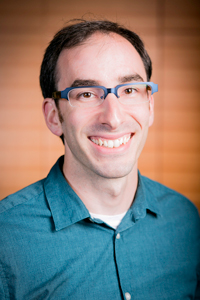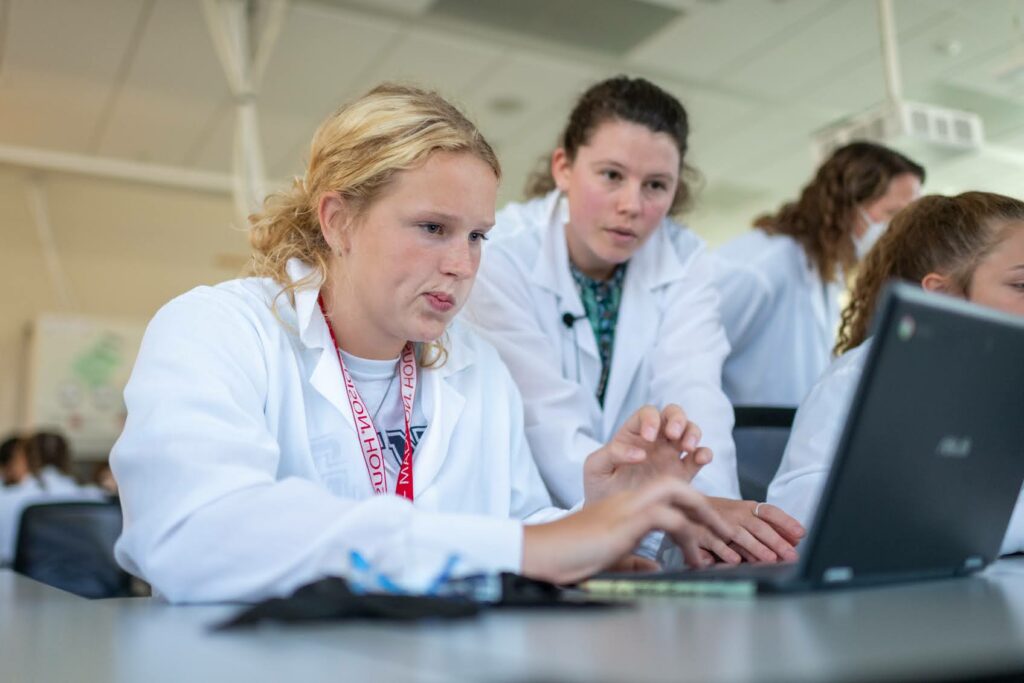On July 10, a group of high school students and five teachers will arrive at Dejope Hall at the UW–Madison campus. The group will make the short walk over to the Discovery Building to tour state-of-the-art biomedical labs. Later, their campus tour will end at the Memorial Union Terrace.
It’s the kick-off for the 2023 Summer Science Camp at the Morgridge Institute.
The students will have traveled from across the state, some from as far north as Park Falls, Wis., near the Chequamegon-Nicolet National Forest, and others from rural communities only a few hours away, including Strum, Darlington and Monroe, Wis.

“It’s going to be another great summer,” says Dan Murphy, with his charismatic smile, and he knows. Murphy, the outreach and lab manager at the institute, has been part of the Summer Science Camp for ten years. “The camp is just plain fun. It’s a whirlwind week where laughter and learning come together. And it’s unforgettable for many campers.”
The Summer Science Camp is a unique, immersive program for high school students and teachers in rural communities and from historically underrepresented groups in science. For four days, participants stay overnight in campus residence halls, explore hands-on activities in state-of-the-art facilities, learn from renowned scientists, and gain extraordinary research experience in a supportive community.
In total, 54 students and 10 teachers will participate in camps held the weeks of July 10 and July 24. This year, campers will learn about computer modeling, stem cell science, quantum mechanics, microscopy, imaging, and more—often using the same tools and technologies used by experts.
“Many of our campers have never done this kind of science and maybe they’ve never met a scientist in these fields,” Murphy says. “Meeting a scientist can be a transformative experience that ignites their passion to pursue education and careers in STEM.”
This year, student campers are participating in a virtual orientation session, Murphy adds. The orientation helps form stronger connections among campers and prepares participants for what’s ahead in their supercharged week on campus.
“The camp is just plain fun. It’s a whirlwind week where laughter and learning come together. And it’s unforgettable for many campers.”
Dan Murphy
This year’s summer camp will take students on an immersive tour into the world of virtual reality. Led by Dr. Raison Dsouza, a research scientist in the Ahlquist Lab, the demo will help visualize SARS-CoV-2 protein structures as a model, among others. This enables scientists to understand their working as a step towards combating such deadly pathogens.
“We are constantly learning by interacting with our surroundings since the time we are born. Most of these interactions are based on vision,” Dsouza says. “Virtual reality combines vision and touch, transcending our learning capabilities into a whole new level.”
But viruses aren’t the only science on board.
Students will also jump into quantum mechanics with Mallory Conlon, an outreach program coordinator with the Wisconsin Quantum Institute. And students witness how stem cells work in unison to ultimately beat together as heart cells in a Petri dish—an experiment that highlights the legacy of the landmark research of Morgridge Investigator Jamie Thomson, who first isolated human embryonic stem cells in 1996.
The camp concludes with a science showcase where student participants become presenters. They share what they’ve learned in a poster session with invited guests in the Discovery Building.

Murphy is quick to point out that science is at the heart of the camp, but it’s more than that.
“The camp is a whole experience. The students live in the dorms, they go on a campus tour, they visit the Terrace — they get to be here which is a special component,” Murphy says. “That helps students envision their own path into science.”
In addition, the camps are an invaluable resource for educators. They provide a unique professional development opportunity around best practices in science education.
The camp is a small but powerful way to help address the STEM skills gap, especially for rural and underrepresented groups in science. There is a growing demand for STEM skills in healthcare, agriculture, environmental science, and engineering. The Wisconsin Rural Schools Alliance and the Upward Bound program are key partners, in addition to funding provided by the Sean Palecek Lab in the College of Engineering through the NSF’s Engineering Research Center for Cell Manufacturing Technologies.
This year, the July 24 camp is named in honor of Ed Jackson, a UW–Madison emeritus professor and chair of medical physics. Jackson was a dedicated member of the Morgridge Scientific Advisory Board and a passionate donor to the Summer Science Camp.
Powerfully, the Summer Science Camps are entirely free-of-charge. Thanks to private support, all lodging, food and transportation are free for students and teachers. Private support also provides each teacher with a supply stipend to help implement activities and experiments back in their school classrooms.
That funding, Murphy adds, is critical for participating schools. Many would not be able to afford the cost of transportation and lodging.
“Every year, we hear that the camps are ‘life-changing,’” says Murphy. “That is all made possible by private support and by the amazing scientists and researchers who volunteer their time to explore science with students and teachers.”
This year, participating schools include:
- Chequamegon High School in Park Falls, WI
- Darlington High School in Darlington, WI
- Elva-Strum Central High School in Strum, WI
- Evansville High School in Evansville, WI
- Mayville High School in Mayville, WI
- Monroe High School in Monroe, WI
- Phillips High School in Phillips, WI
- Upward Bound (Barron, Gillett, Mauston, Shawano, Shell Lake, Siren, Tomah, Tri-County, Turtle Lake, Unity, Wautoma and Westfield sites)
Since 2007, the Summer Science Camp and the Summer Science Workshop Series have helped over 700 high school students and over 150 teachers from more than 100 state high schools. The camp has been offered free of charge thanks to the support of private donors and sponsors, including the Wisconsin Rural Opportunities Foundation, BioForward, the Kathy Smith Fund, the Melita Grunow Fund, and through a grant from the National Science Foundation.
